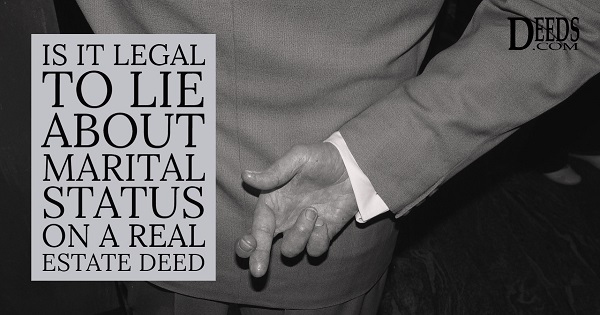Before answering this question, it’s important to understand why the marital status is included on a real estate deed. There are two primary (and related) reasons: marketable titles and spousal shares.

Black’s Law Dictionary, 8th ed. defines marketable title as “… a title that enables a purchaser to hold property in peace during the period of ownership and to have it accepted by a later purchaser who employs the same standards of acceptability.” To be deemed“marketable,” it must contain a clear chain of title (ownership history). In general, this means it’s possible to trace, without gaps or inconsistencies,the property’s owners from the first to the most current. Marketable title is also a common requirement for mortgages and title insurance.
Spousal (or statutory) shares, including dower and curtesy, describe the amount and type of interest due to the spouse of a married property owner when that owner dies. Issues with residual spousal rights can cloud the title and lead to problems with future sales. Because the laws associated with marital shares are complicated, and vary from state to state, it’s best to contact an attorney for help with related questions.
So, deeds contain a recital of the grantor’s (seller’s) marital status to ensure conveyance of spousal rights in the property transfer. By signing (joining) the deed, the spouse agrees to relinquish any residual interests and clears that particular link in the chain of title. If a married person lies about that fact on the deed, and the spouse makes a title claim against the new owners, they, as well as their mortgage holder and title insurer (if any), could face losses.
Further, deeds to real property should be filed for public notice – it’s a requirement in many states – so accuracy is important; false information contaminates the public record. Recorded documents may be used as evidence in court, and there is a presumption that the details they contain are correct (for example, see Cal Evid Code §622).
On the other hand, the grantee (buyer) lying about his/her marital status on a deed brings other possible complications. If a deed contains a lie that is carried over to a mortgage application, and if that detail has some bearing on whether or not the applicant is credit-worthy, then that could result in a criminal charge.
Based on all this information, it’s probably not technically illegal if the grantor lies about his/her marital status on a real estate deed. It could be illegal, however, if that false information is used as sworn evidence or to gain financing. Regardless, any perceived advantage gained from intentionally lying about verifiable facts, such as marital status, is outweighed by the potential for future legal issues. In short, don’t lie on a deed.
